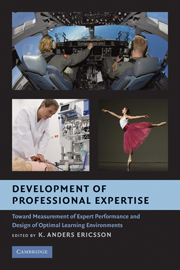 Development of Professional Expertise
Development of Professional Expertise Book contents
- Frontmatter
- Contents
- List of Figures
- List of Tables
- List of Contributors
- 1 The Measurement and Development of Professional Performance: An Introduction to the Topic and a Background to the Design and Origin of This Book
- SECTION 1 CHALLENGES IN PAST AND CONTEMPORARY EFFORTS TO MEASURE AND TRAIN THE OBJECTIVE PERFORMANCE OF PROFESSIONALS
- SECTION 2 PAST AND CONTEMPORARY EFFORTS TO DESIGN INSTRUCTION, TRAIN, AND MAINTAIN PROFESSIONAL PERFORMANCE
- SECTION 3 THE ASSESSMENT AND TRAINING OF SKILLED AND EXPERT PERFORMERS IN THE MILITARY
- SECTION 4 THE DEVELOPMENT OF EXPERTISE AND EXPERT PERFORMANCE
- 15 The Influence of Learning Research on the Design and Use of Assessment
- 16 Acquiring Conceptual Expertise from Modeling: The Case of Elementary Physics
- 17 Teaching for Expertise: Problem-Based Methods in Medicine and Other Professional Domains
- 18 Enhancing the Development of Professional Performance: Implications from the Study of Deliberate Practice
- 19 It Takes Expertise to Make Expertise: Some Thoughts About Why and How and Reflections on the Themes in Chapters 15–18
- 20 The Value of Expertise and Expert Performance: A Review of Evidence from the Military
- 21 Expertise in the Management of People: A New Frontier for Research on Expert Performance
- Name Index
- Subject Index
- References
17 - Teaching for Expertise: Problem-Based Methods in Medicine and Other Professional Domains
Published online by Cambridge University Press: 04 August 2010
- Frontmatter
- Contents
- List of Figures
- List of Tables
- List of Contributors
- 1 The Measurement and Development of Professional Performance: An Introduction to the Topic and a Background to the Design and Origin of This Book
- SECTION 1 CHALLENGES IN PAST AND CONTEMPORARY EFFORTS TO MEASURE AND TRAIN THE OBJECTIVE PERFORMANCE OF PROFESSIONALS
- SECTION 2 PAST AND CONTEMPORARY EFFORTS TO DESIGN INSTRUCTION, TRAIN, AND MAINTAIN PROFESSIONAL PERFORMANCE
- SECTION 3 THE ASSESSMENT AND TRAINING OF SKILLED AND EXPERT PERFORMERS IN THE MILITARY
- SECTION 4 THE DEVELOPMENT OF EXPERTISE AND EXPERT PERFORMANCE
- 15 The Influence of Learning Research on the Design and Use of Assessment
- 16 Acquiring Conceptual Expertise from Modeling: The Case of Elementary Physics
- 17 Teaching for Expertise: Problem-Based Methods in Medicine and Other Professional Domains
- 18 Enhancing the Development of Professional Performance: Implications from the Study of Deliberate Practice
- 19 It Takes Expertise to Make Expertise: Some Thoughts About Why and How and Reflections on the Themes in Chapters 15–18
- 20 The Value of Expertise and Expert Performance: A Review of Evidence from the Military
- 21 Expertise in the Management of People: A New Frontier for Research on Expert Performance
- Name Index
- Subject Index
- References
Summary
The daily train trip between my small hometown and the university city where I used to work has always provided me with lots of unexpected opportunities to receive feedback about students' perceptions of their education. In all those years I have overheard them talking about their studies, teachers, lectures, peers, but also about parties and village gossip. One conversation among three students of a beauty course in one of the community colleges struck me because of the sensible things they were saying about their curriculum. One of the girls was trying to read a chapter in a book about health for their assignment of that week. The book was meant for care and wellness courses, which was their course, taught by a young physician who – as they grumbled – “was not even handsome.” Apart from the appearance of their teacher, which might have been some compensation, their main complaint was that they did not have a clue about the use of this kind of knowledge for their future practice as beauticians.
The girls' complaint is very similar to the situation students in discipline-organized and teacher-centered academic curricula find themselves in. These kinds of curricula have many problems; among them are lack of horizontal and vertical integration of the subjects taught, an absence of apparent practical relevance to the students' perception of their future profession, a constant overload with too many courses, and an emphasis on the principles and practices of the separate academic disciplines instead of the practices of their future profession.
- Type
- Chapter
- Information
- Development of Professional ExpertiseToward Measurement of Expert Performance and Design of Optimal Learning Environments, pp. 379 - 404Publisher: Cambridge University PressPrint publication year: 2009
References
- 5
- Cited by
